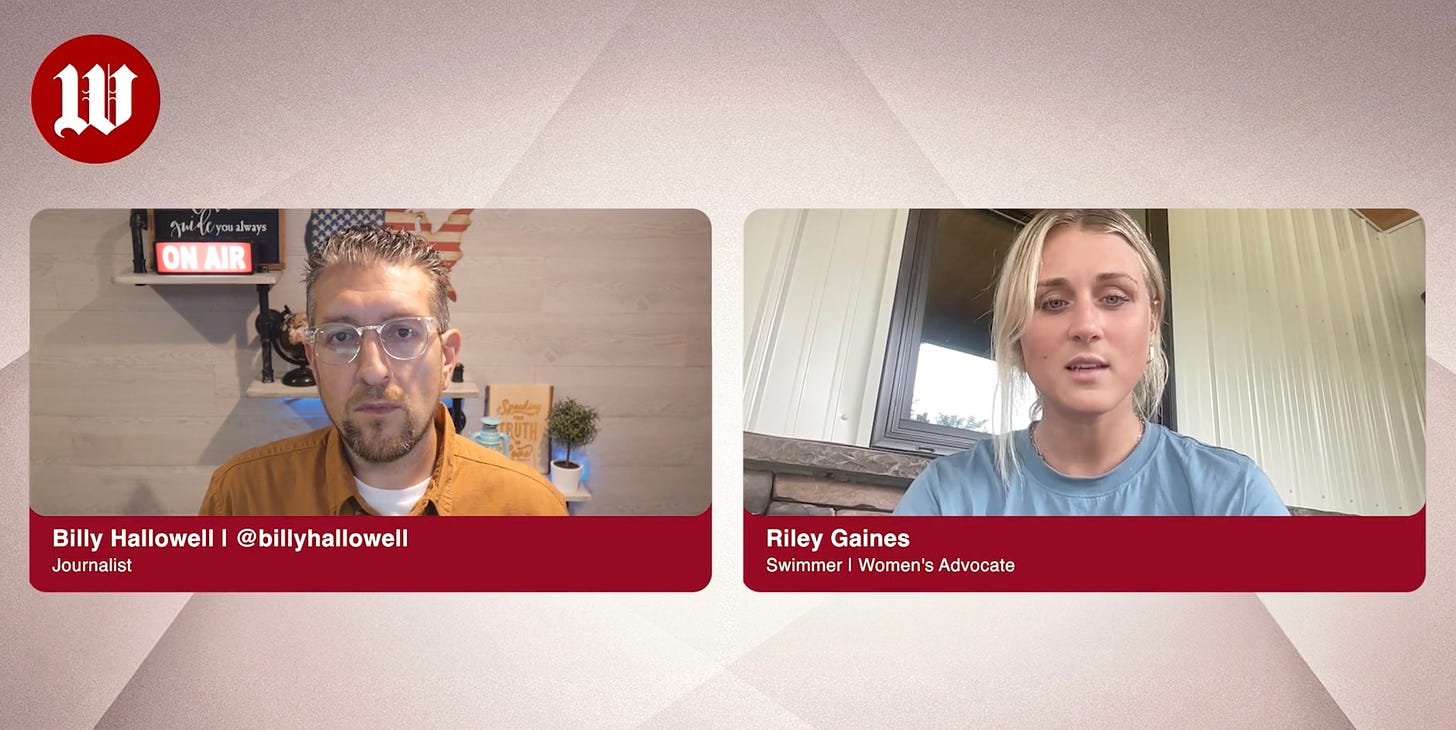'I've Looked...Evil in the Eyes': Riley Gaines on Sports, Hate, and How Her Faith Sustains Her
Former collegiate swimmer Riley Gaines has quickly become a women’s rights icon in conservative circles, with her activism and commentary on transgender issues and sports making waves.
Gaines, who rose to prominence after competing against Lia Thomas, a biological man who identifies as transgender, said she and her fellow swimmers knew it was “wrong” to allow men to compete in women’s sports, yet initially didn't know how to handle the situation.
“We knew it was wrong — what was happening in regards to the competition and the locker room and the silencing,” Gaines said on the “Higher Ground With Billy Hallowell Podcast.” “We all knew it was wrong, and even our coaches, they knew it was wrong.”
But, at first, she said no one spoke up, leading her to some important realizations.
“I kept waiting, and waiting, and waiting for someone else to [speak up], because I thought it was someone else's job,” Gaines said. “I thought surely a coach would do it or a parent — someone's dad would surely stick up for us, or someone with political power.”
She added, “Someone who is supposed to be protecting us would protect us.”
Listen to Gaines tell her story:
But Gaines said she eventually came to a place where she felt personally compelled to address the issue so many were skirting and avoiding openly.
“I came to this realization of — if we as female athletes, we as women weren't willing to stick up for ourselves, how could we expect someone else to?” she said. “That's when I kind of decided to take it upon myself to take a stance … that men should not be in women's sports.”
Gaines also discussed the awkward situation she and other females experienced in the locker room when changing alongside a biological male. Already an uncomfortable and vulnerable place for many, she said the locker room quickly turned even more discomfiting.
“You're fully exposed … but to add someone of the opposite sex with male genitalia, male eyes, a male gaze in that same room … it's awkward, it's embarrassing, it's uncomfortable,” she said. “But it felt like betrayal. And I think the best word to describe it without being over dramatic is ‘traumatic.’”
Gaines expressed frustration over the officials and others who tossed out women’s rights to privacy “without even a second thought” and without regard for those these decisions impacted.
“We all felt violated,” she said.
As for Gaines’ advocacy, she said it would be much easier to be quiet and pretend none of it was going on, especially considering the blowback and intense name-calling and chaos that has befallen her since openly advocating against the inclusion of biological males in female sports.
“They'll label you … transphobic, homophobic, racist, white supremacist, domestic terrorist, fascist,” Gaines said. “But that's all it is — name-calling, because they don't have truth on their side, they don't have common sense, they don't have logic, or reasoning, or science on their side.”
She continued, “We do on our side. Therefore, the only way they can dissuade from our argument is through the petty, personal attacks.”
Gaines credited her Christian faith with helping guide her through the storms that can come along with being so open and vocal about such an explosive issue.
“This is a spiritual battle,” she said. “I've always been spiritual. I grew up in the church. I'm very fortunate to have that firm foundation, but I will tell you, this past year … I have seen very clearly how God works, and how He moves, and how He has His hand on me most certainly.”
But, at the same time, Gaines has received clarity on how the “opposition works,” detailing a “battle of morals versus evil” that has burst into the mainstream.
“I've looked that evil in the eyes when I was in San Francisco, and I was held hostage and assaulted,” she said, referencing the scary situation she faced when protestors came after her earlier this year during an appearance at San Francisco State University. “It's soulless, it's violent, it's vengeful, it's hateful.”
Gaines wants her critics to know there’s no hatred in her heart and noted she has often stops to pray for protestors who heckle her; her motives, she said, are pure.
“I'm doing this out of love,” she said of her activism. “I’m done competing. I'm fighting for this for my future daughter.”
Gaines added, “What about us as women? What about our privacy, what about our safety — our equal opportunity?”
Listen to the full interview here.





